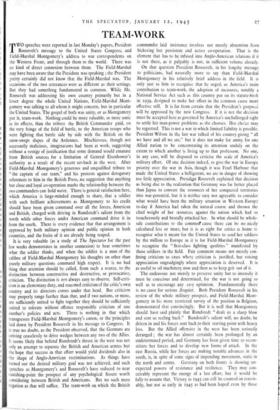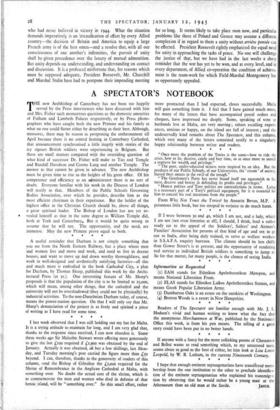TEAM- WORK
TWO speeches were reported in last Monday's papers, President Roosevelt's message to the United States Congress, and Field-Marshal Montgomery's addiess to war correspondents on the Western Front, and through them to the world. There was no kind of direct connexion between them. The Field-Marshal may have been aware that the President was speaking ; the President pretty certainly did not know that the Field-Marshal was. The occasions of the two utterances were as different as their settings. But they had something fundamental in common. While Mr. Roosevelt was addressing his own country primarily but in a lesser degree the whole United Nations, Field-Marshal Mont- gomery was talking to all whom it might concern, but in particular the United States. The gospel of both was unity, or as Montgomery put it, team-work. Nothing could be more valuable, or more tonic in its effects, than the tribute the British Commander paid, on the very fringe of the field of battle, to the American troops who were fighting that battle side by side with the British on the snow-swept slopes of the Ardennes. Mischievous, though not necessarily malicious, imaginations had been at work, suggesting without a vestige of justification that some demand would emanate from British sources for a limitation of General Eisenhower's authority as a result of the recent set-back in the west. After Field-Marshal Montgomery's generous and unqualified tribute to " the captain of our team," and his protests against derogatory references to him in the British Press, no suggestion that anything but close and loyal co-operation marks the relationship between the two commanders can hold water. There is general satisfaction here, which America is large-minded enough to share, that a soldier with such brilliant achievements as Montgomery to his credit should have been given command over all the forces, American and British, charged with driving in Rundstedt's salient from the north while other forces under American command drive it in from the south. There is every evidence that that arrangement is approved by both military opinion and public opinion in both countries, and the fruits of it are already being reaped.
It is very valuable (as a study of The Spectator for the past few weeks demonstrates in another connexion) to hear sometimes what the soldier thinks, and when the soldier is a man of the calibre of Field-Marshal Montgomery his thoughts on other than purely military questions command high respect. It is no bad thing that attention should be called, from such a source, to the distinction between constructive and destructive, or provocative, criticism. The distinction is not always easy to observe. Self-criti- cism is an elementary duty, and reasoned criticism of the critic's own country and its directors comes under that head. But criticism may properly range further than that, and if two nations, or more, are sufficiently united to fight together they should be sufficiently united to tolerate without offence responsible criticism of one another's policies and acts. There is nothing in that which transgresses Field-Marshal Montgomery's canon, or the 'principles laid down by President Roosevelt in his message to Congress. It is true no doubt, as the President observed, that the Germans are striving ceaselessly to drive wedges between any two of the Allies. It seems likely that behind Rundstedt's thrust in the west was not only an attempt to separate the British and American armies but the hope that success in that effort would yield dividends also in the shape of Anglo-American recriminations. As things have turned out the desired military goal was not achieved, and such speeches as Montgomery's and Roosevelt's have reduced to near vanishing-point the prospect of any psychological fissure worth considering between British and Americans. But no such mere negation as that will suffice. The team-work on which the British commander laid insistence involves not merely abstention from bickering but persistent and active co-operation. That is the element that has to be infused into Anglo-American relations if it is not there, as it palpably is not, in sufficient volume already.
On that question President Roosevelt, in his lengthy message to politicians, had naturally more to say than Field-Marshal Montgomery in his relatively brief address in the field. It is only just to him to recognise that he urged, as America's main contribution to team-work, the adoption of measures, notably a National Service Act such as this country put on its statute-book in 1939, designed to make her effort in the common cause more effective still. It is far from certain that the President's proposal will be approved by the new Congress. If it is not the decision must be accepted here as governed by America's unchallenged right to settle her man-power problems as she chooses. Her choice may be regretted. This is not a war in which limited liability is possible. President Wilson in the last war talked of his country giving " all we have and all we are," but it does not make for amity for one Allied nation to be concentrating its attention unduly on the extent to which another is living up to that profession. No one, in any case, will be disposed to criticise the scale of America's military effort. Of one decision indeed, to give the war in Europe priority over the war in Asia, though it was Pearl Harbour that made the United States a belligerent, we are in danger of showing too_ little appreciation. Presidcnt Roosevelt explained that decision as being due to the realisation that Germany was far better placed than Japan to convert the resources of her conquered territories into war-potential, but it is neither easy nor agreeable to consider what would have been the military situation in Western Europe to-day if America had taken the natural course and thrown the chief weight of her resources against the nation which had so treacherously and brutally attacked her. In what should be whole- sale contributions to the commorf cause there can be no nicely calculated less or more, but it is as right for critics at home to recognise what it meant for the United States to send her soldiers by the million to Europe as it is for Field-Marshal Montgomery to recognise the " first-class fighting qualities " manifested by those soldiers in the field. Fair comment means not merely con- fining criticism to cases where criticism is justified, but voicing appreciation ungrudgingly where appreciation is deserved. It is as useful to oil machinery now and then as to keep grit out of it.
The endeavour not merely to preserve unity but to intensify it must be conscious and determined, for the war is not going so well as to encourage any easy optimism. Fundamentally there is no cause for serious disquiet. Both President Roosevelt in his review of the whole military prospect, and Field-Marshal Mont- gomery in his more restricted survey of the position in Belgium, demonstrated that convincingly. But it is well that Montgomery should have said plainly that Rundstedt " dealt us a sharp blow and sent us reeling back." Rundstedt's salient will, no doubt, be driven in and his forces sent back to their starting-point with heavy loss. But the Allied offensive in the west has been seriously deranged ; the war has almost certainly been prolonged by an undetermined period, and Germany has been given time to recon- stitute -her forces and to develop new forms of attack. In the east Russia, while her forces are making notable advances in the south, is, in spite of some signs of impending movement, static in the north and centre. Germany on both fronts is showing un- expected powers of resistance and resilience. They may con- ceivably represent the energy of a last effort, but it would be folly to assume that. Victory in 1945 can still be counted on reason- ably, but not as early in 1945 as had been hoped even by those who had never believed in victory in 1944. What the situation demands imperatively is an intensification a effort by every Allied country—the decision of Britain and America to equip a large French army is of the best omen—and a resolve that, with all our consciousness of one another's infirmities, the pursuit of unity shall be given precedence over the luxury of mutual admonition. But unity depends on understanding, and understanding on contact and discussion. It is a profound misfortune that, for reasons which must be supposed adequate, President Roosevelt, Mr. Churchill and Marshal Stalin have had to postpone their impending meeting for so long. It seems likely to take place soon now, and particular problems like those of Poland and Greece may assume a different complexion if in regard to them a unity without arriere pens& can be effected. President Roosevelt rightly emphasised the equal need for unity in approaching the tasks of peace. No one will challenge the justice of that, but we have had in the . last weeks a sharp reminder that the war has yet to be won, and at every level, and in every department, of Allied co-operation the condition of achieve- ment is the team-work for which Field-Marshal Montgomery has so opportunely appealed.























 Previous page
Previous page